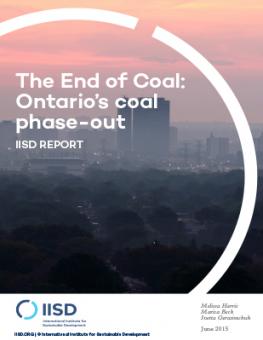
The End of Coal: Ontario’s coal phase-out
Ontario has successfully implemented its policy to put an end to coal use in 2014. This energy transition has become “the single largest GHG reduction measure in North America”: since 2007, when coal accounted for about 25 per cent of its electricity generation, Ontario has reduced its greenhouse gas emissions by approximately 34 Mt or 17 per cent.
What lessons can be learned from Ontario’s coal phase-out experience? How can its success be replicated in other parts of the globe? This paper explores this question for all those around the world who may draw inspiration and lessons learned from Ontario: policy-makers, campaigners, entrepreneurs and others interested in transitioning to a low-carbon future.
We rely on the concept of the “window of opportunity” and suggest that all elements critical to a sustainable energy transition can be clustered within the four “panes” of this “window”: context, champions, concerns and complementary policies. These “panes” provide the basis for the structure of this paper. This analysis has been informed by a comprehensive review of existing literature and semi-structured interviews with high-level experts from Canadian political and academic circles, industry and civil society.
Participating experts
You might also be interested in
Powering the Clean Energy Transition: Net-Zero electricity in Canada
This brief explains how a shift to clean power generation can offer affordable, reliable electricity, benefiting households and businesses alike.
IISD Welcomes Draft Regulations for Oil and Gas Pollution Cap
A firm cap on emissions can provide certainty for industry to invest in decarbonization, while ensuring the sector is on a path to net-zero by 2050.
For Nature-Based Solutions to Be Effective, We Need to Work with Indigenous Peoples and Local Communities
Nature-based solutions have been praised as a promising approach to tackling the twin crises of climate change and biodiversity loss. But some Indigenous Peoples and local communities are questioning the legitimacy of the concept and what it symbolizes. It is time to listen to what they have to say.
How Fossil Fuels Drive Inflation and Make Life Less Affordable for Canadians
New report takes closer look at how Canada’s dependence on fossil fuels impacts energy costs and prices of essentials such as transportation, home heating, and housing.